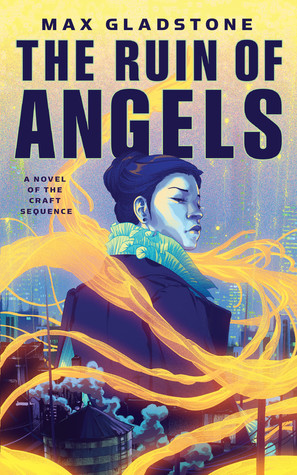More on this book
Community
Kindle Notes & Highlights
Time’s like an ocean, she prayed back. People only swim in the top bit.
“Did it ever occur to you,” Kai said, “how overblown that sounds? Final descent. Poets take a final descent into the hells. Emperors have a final descent from the throne before someone chops off their heads. We’re about to land, which we will presumably survive, to descend again.”
“We’re landing in Agdel Lex, ma’am. Down isn’t always where you left it, and you can’t ever trust your eyes.”
Gods save us from our sisters. Sisters know us before we know to hide our secrets, before we learn to guard the latches that close our soul, to hide the chinks in the diamonds that become our armor as we recline upon our hoard. And sisters remember.
But while faith, in general, had the same dynamics no matter its object, gods and idols were works of art, and begged thematic consistency.
Some people let themselves die when their time came. Some grappled to a reasonable facsimile of life, sustained by insurance contracts, phylacteric trusts, and premortem exercises. Others were Vogel. He just died, decayed, and stuck around.
She breathed anise steam and saw again the shelves lined with books waiting to be read: jokes and histories (they were the same, if you had a dark sense of humor), maps and tragedies, diaries and diagrams, passed down, waiting.
Death came cheap in Agdel Lex, if you knew the market and weren’t afraid to comparison shop.
Close friends, Zeddig had found, developed a sort of telepathy. Nothing mystical about it—though a musing Craftswoman might spin you a tale of spiritual entanglement and primitive localized divinity, then charge you a few hundred thaums for the musing.
Feelings don’t strike turn by turn: they well up stepwise with slow reaction rates, as an alchemist would say, causes transforming into effects even as traces of cause remain. Human features, no matter how expressive, are too slow and simple to convey this welling conflict, and tend to freeze in some awkward intermediate position while the process works out.
Lava, flowing into the sea, cools with an eruption of steam, leaving arches, bridges, structures that endure when the heat’s gone. Lava wasn’t often sentient, and volcanoes didn’t talk much, but Kai wondered, sometimes, if they ever felt embarrassed by the visible aftermath of their eruption.
Someone else had made her a weapon, but she made herself kind.
“What is this thing we call form, and to what extent do we comprehend our own forms? I have a form, surely, as do you, and let us grant that we’re both conscious even though certain philosophers would argue that assertion—fortunately they’re not here. So! Both conscious. But we have imperfect knowledge of our own forms, let alone our own selves—consider the human man, his last self-image formed at the age of twenty-five, surprised by wrinkles on his forehead as he looks in the bathroom mirror. Deathless Kings’ residual physicalities endure long after they’ve become skeletons—and they perform
...more
We are not complete in ourselves without others, without a world to complement our self-conception—and were we to become so complete, we could not bear it! The fullness of ourselves would break us. We burn. The point of Figment/Fragment/Filament”—claws spread to encompass the whole warehouse space—“is to reflect, refract the beauty of physical form, the glorious futility of our quest for complete knowledge, mastery, or independence.
“We all doubt, sometimes. We doubt ourselves, our worlds, our truths. It can happen to anyone. Even to people of faith. When we can no longer bear the work, we seek refuge in a clearer mind.”
But that passed, and now she felt like she had at the bloody end: they were two perfect spheres trapped in mutual orbit, bound, but unable to touch.
No city is one city, as no one mind is altogether and only itself. A woman is many women, a man is many men, a city is many cities—not in sequence, but all at once.
Human minds being human minds, some grim fatalist tendency that really should have focused on survival still took the time to note: you can always trust Gods for shit timing.
People lasted as stories, as gods did. And people and gods alike told themselves stories as they died, because dying hurt, and stories helped.
“GODS,” ZEDDIG SAID AS Ley led them through the Wastes, “are stories people tell. The Hidden Schools claim gods evolved with us. We order the world in our minds, and our stories gather strength and power. Through them we become more than meat, and through us they become more than wind. Faiths are eyes through which we know the world. Gods and goddesses sing ourselves back to us through time.”
Zeddig liked the girl: a sharp little vector who looked at everything as if it might kill her, but if it didn’t, she’d write a poem about it later.
I do not understand you. But neither do I understand fire, or starlight, or storms, and I love them.
Then again, she’d worked with smart people—hells, she was smart people—and she never ceased to be amazed by how smart people could fuck up, given opportunity and time.


